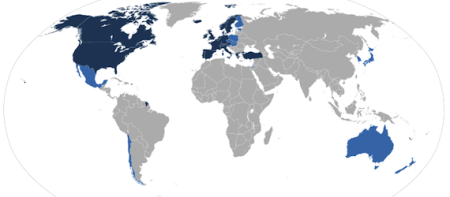As published by a new OECD report, total health spending has fallen in one of three OECD countries between 2009 and 2011, with those hardest hit by the crisis most affected. This development marks a significant reversal from the strong growth in the years prior to the crisis.
The publication entitled ‘Health at a Glance 2013’ states that under these conditions, countries had to make the improvement and enhanced productivity, efficiency and affordability of their healthcare systems a priority.
Between the years 2009 and 2011, one third of the 33 OECD countries had lowered their per capita spending, in particular by 11.1% in Greece and 6.6% in Ireland. Other countries such as Canada and the US also registered slowed growth by 0.8% and 1.3% respectively.
Israel and Japan are the only two exceptions as, compared with the previous decade, these countries accelerated their growth rate in health spending. Health spending in Korea has continued to increase by more than 6% annually since 2009, however more slowly than in prior years.
By cutting prices of medical goods, in particular pharmaceuticals, and by restricting their health budgets and implementing wage cuts in hospitals, governments have worked to lower spending.
A cut in real-term spending on prevention programmes in 2011 over 2010, was reported by more than three-quarters of OECD countries, with half spending less than in 2008. However these cuts to spending on cost-effective prevention programmes on obesity, harmful use of alcohol and smoking are reported as a cause for concern by the report, with the long-term impact on health and spending being likely to greatly outweigh any short-term benefits to budgets.
Also affecting access to care are increases in direct out-of-pocket payments for patients, which are the consequence of reductions in the supply of health services and changes in their financing. Waiting times for some operations in Portugal, Spain, England and Ireland register some increase, after years of consistent improvement.
According to the OECD, across all surveyed countries the worst affected are the low-income groups whi may be foregoing needed care such as medicines or check-ups for chronic conditions, potentially causing long-term health and economic consequences on society’s most vulnerable.
Health’s impact of the crisis has been varied on other measures: after registering a surge in suicide rates at the start of the crisis, a stabilisation has since been recorded. Traffic accidents mortality rates have fallen, which could be associated with the fact that the crisis has led to fewer cars on the roads, hence fewer accidents were happening overall. The consumption of alcohol and tobacco also declined in many countries too.
Health at a Glance 2013 includes some of the below findings:
- For the first time, average life expectancy exceeded 80 years across OECD countries in 2011, an increase of ten years since 1970. This trend shows no sign of slowing down. Those born in Switzerland, Japan and Italy can expect to live the longest among OECD countries.
- Chronic diseases such as diabetes and dementia are increasingly prevalent. In 2011, close to 7% of 20-79 year-olds in OECD countries, or over 85 million people, had diabetes. This number is likely to increase in the years ahead, given the high and often growing rates of obesity across the developed world.
- The market share of generic drugs has increased significantly over the past decade in many countries. However, generics still represent less than 25% of the market in Luxembourg, Italy, Ireland, Switzerland, Japan and France, compared with about 75% in Germany and the United Kingdom.
- The burden of out-of-pocket spending creates barriers to health care access in some countries. On average in the OECD, 20% of health spending is paid directly by patients; this ranges from less than 10% in the Netherlands and France to over 35% in Chile, Korea and Mexico.
- Across OECD countries, more than 15% of people aged 50 and older provide care for a dependent relative or friend, and most informal carers are women.
Additional country-specific information can be viewed on the OECD’s website.
Source: OECD
Image credit: Wikipedia
21 November 2013
Latest Articles
Health, Reports, OECD
As published by a new OECD report, total health spending has fallen in one of three OECD countries between 2009 and 2011, with those hardest hit by the cri...



























